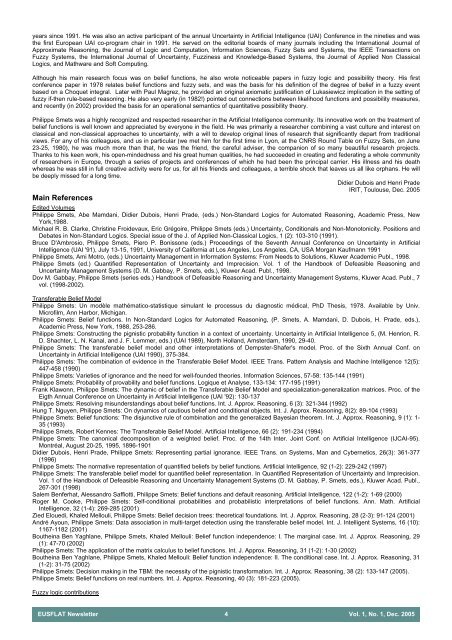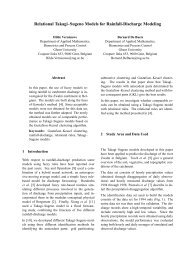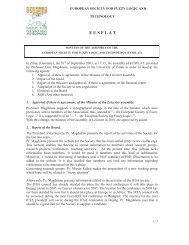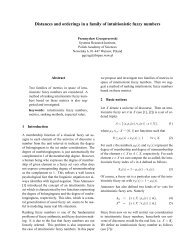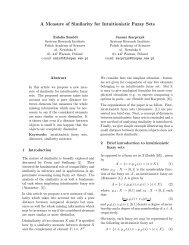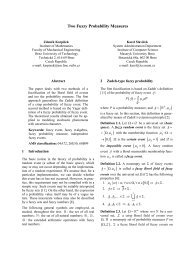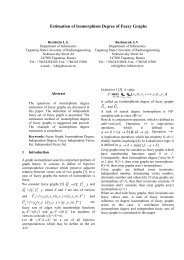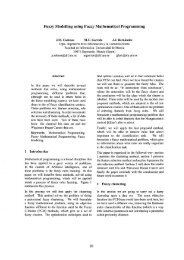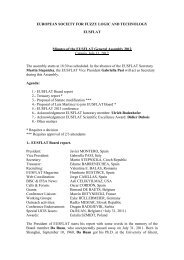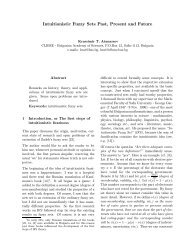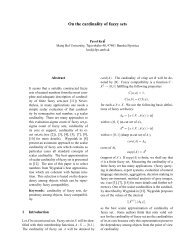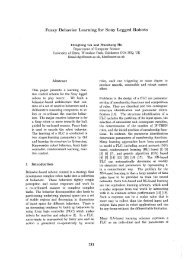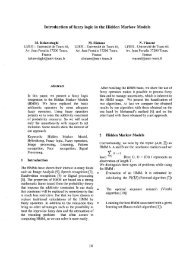Vol. 1, No. 1, December 2005 - EUSFLAT
Vol. 1, No. 1, December 2005 - EUSFLAT
Vol. 1, No. 1, December 2005 - EUSFLAT
Create successful ePaper yourself
Turn your PDF publications into a flip-book with our unique Google optimized e-Paper software.
years since 1991. He was also an active participant of the annual Uncertainty in Artificial Intelligence (UAI) Conference in the nineties and was<br />
the first European UAI co-program chair in 1991. He served on the editorial boards of many journals including the International Journal of<br />
Approximate Reasoning, the Journal of Logic and Computation, Information Sciences, Fuzzy Sets and Systems, the IEEE Transactions on<br />
Fuzzy Systems, the International Journal of Uncertainty, Fuzziness and Knowledge-Based Systems, the Journal of Applied <strong>No</strong>n Classical<br />
Logics, and Mathware and Soft Computing.<br />
Although his main research focus was on belief functions, he also wrote noticeable papers in fuzzy logic and possibility theory. His first<br />
conference paper in 1978 relates belief functions and fuzzy sets, and was the basis for his definition of the degree of belief in a fuzzy event<br />
based on a Choquet integral. Later with Paul Magrez, he provided an original axiomatic justification of Lukasiewicz implication in the setting of<br />
fuzzy if-then rule-based reasoning. He also very early (in 1982!) pointed out connections between likelihood functions and possibility measures,<br />
and recently (in 2002) provided the basis for an operational semantics of quantitative possibility theory.<br />
Philippe Smets was a highly recognized and respected researcher in the Artificial Intelligence community. Its innovative work on the treatment of<br />
belief functions is well known and appreciated by everyone in the field. He was primarily a researcher combining a vast culture and interest on<br />
classical and non-classical approaches to uncertainty, with a will to develop original lines of research that significantly depart from traditional<br />
views. For any of his colleagues, and us in particular (we met him for the first time in Lyon, at the CNRS Round Table on Fuzzy Sets, on June<br />
23-25, 1980), he was much more than that, he was the friend, the careful adviser, the companion of so many beautiful research projects.<br />
Thanks to his keen work, his open-mindedness and his great human qualities, he had succeeded in creating and federating a whole community<br />
of researchers in Europe, through a series of projects and conferences of which he had been the principal carrier. His illness and his death<br />
whereas he was still in full creative activity were for us, for all his friends and colleagues, a terrible shock that leaves us all like orphans. He will<br />
be deeply missed for a long time.<br />
Didier Dubois and Henri Prade<br />
IRIT, Toulouse, Dec. <strong>2005</strong><br />
Main References<br />
Edited <strong>Vol</strong>umes<br />
Philippe Smets, Abe Mamdani, Didier Dubois, Henri Prade, (eds.) <strong>No</strong>n-Standard Logics for Automated Reasoning, Academic Press, New<br />
York,1988.<br />
Michael R. B. Clarke, Christine Froidevaux, Eric Grégoire, Philippe Smets (eds.) Uncertainty, Conditionals and <strong>No</strong>n-Monotonicity. Positions and<br />
Debates in <strong>No</strong>n-Standard Logics. Special issue of the J. of Applied <strong>No</strong>n-Classical Logics, 1 (2): 103-310 (1991).<br />
Bruce D'Ambrosio, Philippe Smets, Piero P. Bonissone (eds.) Proceedings of the Seventh Annual Conference on Uncertainty in Artificial<br />
Intelligence (UAI '91), July 13-15, 1991, University of California at Los Angeles, Los Angeles, CA, USA Morgan Kaufmann 1991<br />
Philippe Smets, Ami Motro, (eds.) Uncertainty Management in Information Systems: From Needs to Solutions, Kluwer Academic Publ., 1998.<br />
Philippe Smets (ed.) Quantified Representation of Uncertainty and Imprecision. <strong>Vol</strong>. 1 of the Handbook of Defeasible Reasoning and<br />
Uncertainty Management Systems (D. M. Gabbay, P. Smets, eds.), Kluwer Acad. Publ., 1998.<br />
Dov M. Gabbay, Philippe Smets (series eds.) Handbook of Defeasible Reasoning and Uncertainty Management Systems, Kluwer Acad. Publ., 7<br />
vol. (1998-2002).<br />
Transferable Belief Model<br />
Philippe Smets: Un modèle mathématico-statistique simulant le processus du diagnostic médical, PhD Thesis, 1978. Available by Univ.<br />
Microfilm, Ann Harbor, Michigan.<br />
Philippe Smets: Belief functions. In <strong>No</strong>n-Standard Logics for Automated Reasoning, (P. Smets, A. Mamdani, D. Dubois, H. Prade, eds.),<br />
Academic Press, New York, 1988, 253-286.<br />
Philippe Smets: Constructing the pignistic probability function in a context of uncertainty. Uncertainty in Artificial Intelligence 5, (M. Henrion, R.<br />
D. Shachter, L. N. Kanal, and J. F. Lemmer, eds.) (UAI 1989), <strong>No</strong>rth Holland, Amsterdam, 1990, 29-40.<br />
Philippe Smets: The transferable belief model and other interpretations of Dempster-Shafer's model. Proc. of the Sixth Annual Conf. on<br />
Uncertainty in Artificial Intelligence (UAI 1990), 375-384.<br />
Philippe Smets: The combination of evidence in the Transferable Belief Model. IEEE Trans. Pattern Analysis and Machine Intelligence 12(5):<br />
447-458 (1990)<br />
Philippe Smets: Varieties of ignorance and the need for well-founded theories. Information Sciences, 57-58: 135-144 (1991)<br />
Philippe Smets: Probability of provability and belief functions. Logique et Analyse, 133-134: 177-195 (1991)<br />
Frank Klawonn, Philippe Smets: The dynamic of belief in the Transferable Belief Model and specialization-generalization matrices. Proc. of the<br />
Eigth Annual Conference on Uncertainty in Artificial Intelligence (UAI '92): 130-137<br />
Philippe Smets: Resolving misunderstandings about belief functions. Int. J. Approx. Reasoning, 6 (3): 321-344 (1992)<br />
Hung T. Nguyen, Philippe Smets: On dynamics of cautious belief and conditional objects. Int. J. Approx. Reasoning, 8(2): 89-104 (1993)<br />
Philippe Smets: Belief functions: The disjunctive rule of combination and the generalized Bayesian theorem. Int. J. Approx. Reasoning, 9 (1): 1-<br />
35 (1993)<br />
Philippe Smets, Robert Kennes: The Transferable Belief Model. Artificial Intelligence, 66 (2): 191-234 (1994)<br />
Philippe Smets: The canonical decomposition of a weighted belief. Proc. of the 14th Inter. Joint Conf. on Artificial Intelligence (IJCAI-95).<br />
Montréal, August 20-25, 1995, 1896-1901<br />
Didier Dubois, Henri Prade, Philippe Smets: Representing partial ignorance. IEEE Trans. on Systems, Man and Cybernetics, 26(3): 361-377<br />
(1996)<br />
Philippe Smets: The normative representation of quantified beliefs by belief functions. Artificial Intelligence, 92 (1-2): 229-242 (1997)<br />
Philippe Smets: The transferable belief model for quantified belief representation. In Quantified Representation of Uncertainty and Imprecision.<br />
<strong>Vol</strong>. 1 of the Handbook of Defeasible Reasoning and Uncertainty Management Systems (D. M. Gabbay, P. Smets, eds.), Kluwer Acad. Publ.,<br />
267-301 (1998)<br />
Salem Benferhat, Alessandro Saffiotti, Philippe Smets: Belief functions and default reasoning. Artificial Intelligence, 122 (1-2): 1-69 (2000)<br />
Roger M. Cooke, Philippe Smets: Self-conditional probabilities and probabilistic interpretations of belief functions. Ann. Math. Artificial<br />
Intelligence, 32 (1-4): 269-285 (2001)<br />
Zied Elouedi, Khaled Mellouli, Philippe Smets: Belief decision trees: theoretical foundations. Int. J. Approx. Reasoning, 28 (2-3): 91-124 (2001)<br />
André Ayoun, Philippe Smets: Data association in multi-target detection using the transferable belief model. Int. J. Intelligent Systems, 16 (10):<br />
1167-1182 (2001)<br />
Boutheina Ben Yaghlane, Philippe Smets, Khaled Mellouli: Belief function independence: I. The marginal case. Int. J. Approx. Reasoning, 29<br />
(1): 47-70 (2002)<br />
Philippe Smets: The application of the matrix calculus to belief functions. Int. J. Approx. Reasoning, 31 (1-2): 1-30 (2002)<br />
Boutheina Ben Yaghlane, Philippe Smets, Khaled Mellouli: Belief function independence: II. The conditional case. Int. J. Approx. Reasoning, 31<br />
(1-2): 31-75 (2002)<br />
Philippe Smets: Decision making in the TBM: the necessity of the pignistic transformation. Int. J. Approx. Reasoning, 38 (2): 133-147 (<strong>2005</strong>).<br />
Philippe Smets: Belief functions on real numbers. Int. J. Approx. Reasoning, 40 (3): 181-223 (<strong>2005</strong>).<br />
Fuzzy logic contributions<br />
<strong>EUSFLAT</strong> Newsletter 4 <strong>Vol</strong>. 1, <strong>No</strong>. 1, Dec. <strong>2005</strong>


